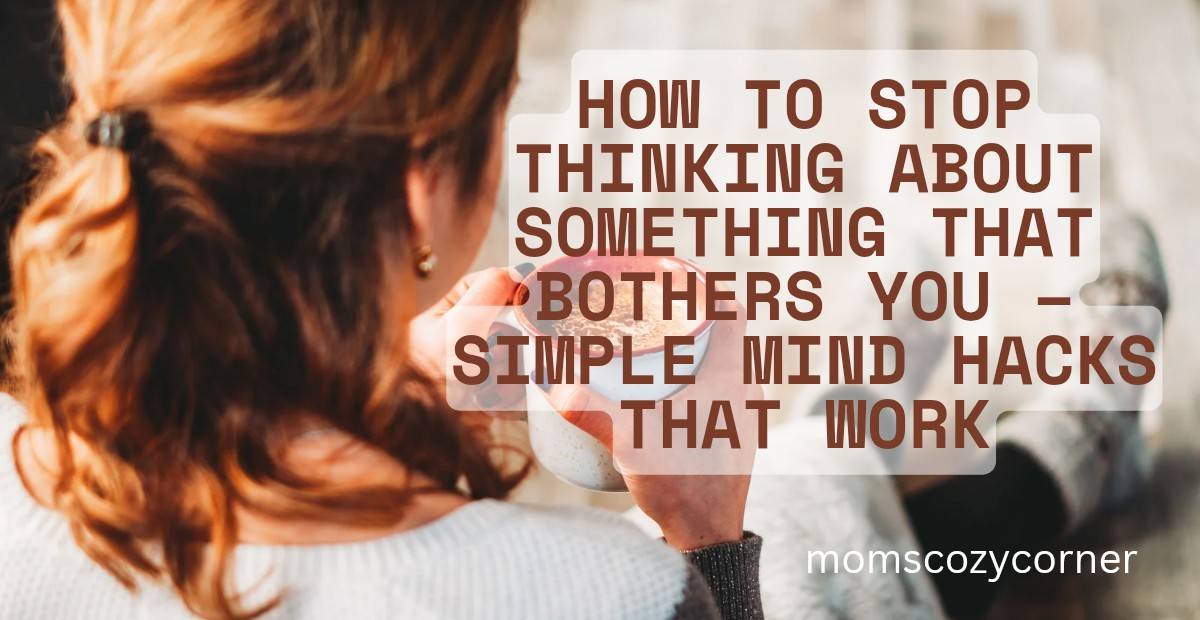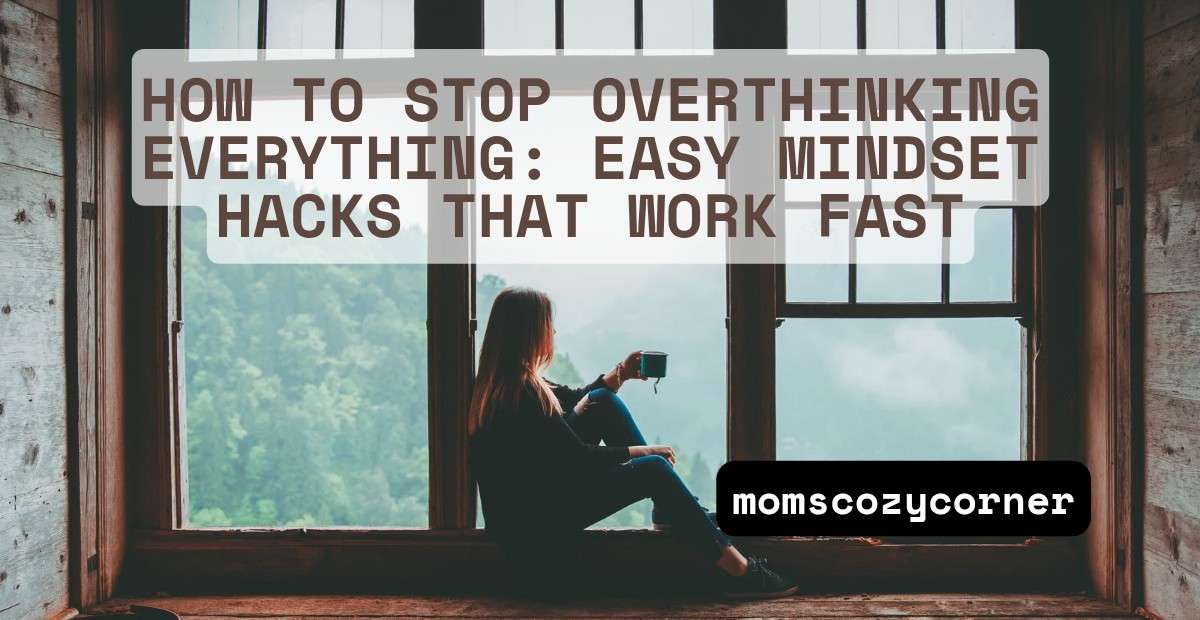How to Stop Thinking About Something That Bothers You and Move On for Good
Introduction
Ever catch yourself overthinking something and suddenly realize—whoa, where did the last half hour go? Yeah, me too. It’s crazy how hard it can be to stop thinking about something that bothers us once our mind latches onto it. One day, I was sitting in the corridor and heard a mom scolding her child. The kid was crying, and suddenly, all my own tough moments with my daughter popped into my head. I got so caught up in it that I couldn’t focus on anything. Negative thoughts kept swirling, and I kept thinking, I’m not a good mom. I can’t teach her emotional stability. I’m failing somehow. No matter how hard I tried, I just couldn’t stop thinking negatively.
But you know what? I just can’t keep going like this—I need to stop these negative thoughts. You know what’s cool? We can actually get over something that bothers us, and it’s simpler than you think. It’s all about spotting what triggers our overthinking and learning little ways to let go emotionally without draining ourselves. Stuff like how to process it, release it, and still live life happily. And don’t worry—I’ve shared all those tips and tricks in the article below, so you can start putting them into action right away.
Why Your Mind Keeps Thinking About Something (and Won’t Let It Go)
Ever wonder why your mind plays tricks on you? There are many reasons, but here are the three main ones I’ve noticed.

# That Urge to Fix Things Keeps You Thinking About It
There was a time I was under financial stress, my mind always thinking about where I went wrong with money and how to fix it. I was thinking constantly, my thoughts all over the place, trying to find a solution. That need to “fix it” made me keep thinking about the same worry over and over.
# When Past Hurts Keep Your Mind Stuck on Repeat
Sometimes, past experiences trigger our brain’s natural rumination loop. My friend went through a painful breakup, and even after years, she still can’t stop thinking about what happened, and it bothers her every time she remembers those moments. Deep down, she can’t get over who hurt her—her boyfriend—and sometimes she starts to feel like there is something wrong with her. That’s why her mind keeps replaying it again and again.
# When You Try Too Hard to Control Your Thoughts
Have you ever noticed that the more you try to control the thoughts, the harder it gets? I told myself not to think about throwing up during a car ride, but no matter how much I tried—it just stuck in my head. That’s what experts call the ironic process theory—the harder we push a thought away, the more our brain clings to it.
How to Stop Overthinking and Let Go
We all get stuck in that endless thought loop, trying hard to move on. Based on the three common struggles we discussed, here’s how to handle each and finally let go.
If you often catch yourself trapped in a loop of thoughts and can’t seem to quiet your mind, you might also love reading How to Stop Overthinking Everything and Find Peace in Daily Life. It dives deeper into simple, real-life ways to calm your mind and reclaim your peace.

# Train Your Mind the CBT Way
CBT—Cognitive Behavioral Therapy—sounds fancy, but it’s really simple. Psychologists use it to spot thought loops and replace unhealthy reactions with protective, healthy behaviors. I tried this when my daughter came home upset that her teacher roughly handled her during sports. Before, I was thinking too hard, trying to find a solution but getting nowhere. By writing down what happened, listing possible outcomes, and planning a calm approach, I finally stopped what was bothering me, which helped me organize my thoughts and handle the situation effectively. I politely asked the teacher; she explained it was unintentional and promised to be more careful—which gave me confidence I handled it the best way.
# Acceptance and Commitment Therapy (ACT)
ACT might sound complicated, but it’s really about accepting reality and focusing on what you can control. I used to feel frustrated, disappointed, and even hurt because my husband wasn’t the partner I had imagined—he didn’t help with chores, spent hours on his phone, and I just couldn’t stop thinking about it, and it bothers me every time I replayed those moments in my head. The loop of negative thoughts kept me stressed and irritable. But once I accepted what I cannot change, saw my thoughts as just thoughts, and focused on his good qualities, I could emotionally let go of something, stop ruminating thoughts, and finally clear my mind. I felt calmer, more grateful, and free from the heavy weight of those repetitive worries.
# Paradoxical Intention: How to Not Think
Sometimes, no matter how much I try, I just can’t stop dwelling on things. That’s where paradoxical intention comes in—basically, accepting what’s happening instead of fighting it, which helps me overcome overthinking. I realized this with my car sickness. Before, thinking, “I shouldn’t throw up” only made it worse. While googling ways to quiet my mind or turn off my thoughts, I came across this approach. I told myself, “If I throw up, I’ll be ready with a bag.” Accepting the situation became a critical step in processing thoughts effectively, which surprisingly stopped my obsessive thinking and broke the loop completely.
Simple Ways to Distract Yourself from Thinking About Something
When deeper methods feel out of reach, or your mind just won’t switch off, distraction can be your friend. Here are simple ways to relax your mind and bring calm thoughts back into your day.

# Try a Quick Brain Dump
Whenever I feel my mind thinking constantly, spinning with worries I can’t control, it’s exhausting—I can barely pick up the phone or talk to anyone. My mind has been focused on the same recurring thoughts, and my heart races with anxiety. That’s when I do a quick brain dump—writing everything out, letting every fear, frustration, and random thought spill onto paper. Sometimes, I even stand in front of the mirror and let the tears flow, which helps me relax my mind and stop my mind from racing. This simple act lets me get rid of thinking that’s been haunting me, and I can finally breathe again. When I feel like something bad is going to happen, writing it down helps me stop thinking of the past and regain a calm, clear perspective.
# Move Your Body to Shift Your Focus
You know, sometimes the easiest way to stop thinking about what bothers you is just to move from where you are. I knew this before, but I never really noticed how powerful it was until I saw it with my kid. When she cries, I take her out—maybe to our little garden or just where she can see the open sky. The moment we step out, she calms down. That shift in view works like magic.
One day it hit me—if this simple change works for her, why not for me? I was stuck in an intrusive thought, my little one crying beside me, and my irritation rising. So, I walked to the balcony. The change of view helped me slow down and think—not spiral, just analyze. It helps my brain to train and focus better instead of worrying about things that haven’t even happened.
# Art Magic: Do What Feels Good
Who doesn’t love a little music, right? But even if you’re not into songs, there’s always something that lights you up—maybe crafts, drawing, or decorating. One of my friends doesn’t like music at all, but give her some DIY stuff and she’s in her happy place. She once told me, “Whenever something keeps running in my head, I just grab my glue gun and start creating.” And it totally works for her.
That’s when I realized—it’s not about what you do; it’s about how it makes you feel. When your hands get busy, your mind naturally chills out. Whether it’s dancing, doodling, or just making cute things for your home, these little ‘art magic’ moments can quietly pull you out of that mental mess and bring you back to calm.
How to Do a Mental Detox
Doing a mental detox doesn’t mean tossing out every thought in your head. It’s more like hitting a reset button—giving your mind a little breather. Sometimes, thoughts sneak in and slowly drain us until our brain just screams for a break.
Life’s all connected. When family stress hits, work feels heavier. When work’s tough, it spills into home life. A mental detox helps untangle those emotions and brings back calm.

# Identify What’s Weighing You Down
I start by noticing what really drains me—a person, a situation, or even my own self-talk. If you’re an introvert like me who feels bad for not socializing like others, pause and ask—is it really a flaw, or just your comfort zone? Spotting triggers is step one.
# Do a Digital Detox
A friend once uninstalled Instagram because seeing picture-perfect moms made her feel like a failing mom. She said she just couldn’t stop thinking about it — it really bothers her whenever she saw those posts. So, instead of overthinking, she took a break. It wasn’t drama—just a way to protect her mental space. That little digital detox really helped her reset.
# Declutter Your Physical Space
A messy room can mess with your mind. Ever rush out searching for keys, only to replay the chaos while driving? Keeping your space organized helps calm your thoughts.
# Get Enough Sleep
I used to take short naps, putting work aside, because skipping them meant snapping at my kids or unfinished work. Just 15–20 minutes works wonders, calming my mind and boosting energy.
# Write It All Out
Journaling lets your heart speak. Let out all the weight on your heart—the feelings, the words, even the tears that’ve been holding you down. It’s not about perfect writing—it’s about releasing weight off your chest so your mind can breathe.
# Stay Physically Active
Mind and body are teammates. Walks, yoga, or stretching release tension. When your body feels good, your emotions naturally settle.
Final Thoughts
We all want a peaceful, happy life, right? But sometimes it’s hard to stop thinking about what bothers us. The way we grew up shaped us, but what we decide now—the small changes we make—can create a calmer, happier future.
If you’re reading this, it’s proof that you’re ready for that change. Maybe your mind feels like a cage full of thoughts you can’t shake off, and you’re looking for a way out.
If any of these tips help—even a little—please let me know in the comments. I genuinely read every one. And if you know someone who could really use this advice, go ahead and share it with them too.
Here’s to calmer days and fewer overthinking moments!




